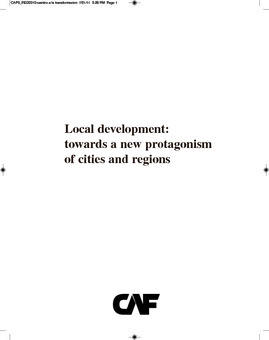Local economic development. Some cities develop more than others: specialization, human capital and institutions
Resumen
Why does a certain metropolitan area grow more than another? The answer to this question has evaded much of the considerable body of scholarship on the topic. One problem may be that some of the frameworks that drive empirical research in this field tend be based on ad hoc combinations of explanatory factors, ranging from natural climate to business climate to land and labor costs. Theoretical approaches emphasize differences in economic specialization: some activities have higher rates of growth than others, and this translates into divergence in medium-term rates of inter-urban growth and income. But specialization itself needs to be explained. International economics has adopted theoretical frameworks for explaining different growth rates and income levels among countries involving multiple causes and their potentially recursive interactions. Three main forces are at the heart of this literature: specialization, labor force and human capital issues, and institutions. This framework can be fruitfully adapted to the analysis of metropolitan growth and change. The thorniest aspect of doing so is to consider recursive relationships among the three in a dynamic model, where specialization, human capital and institutions are endogenous to the explanation, and where causality can reverse over time in complex sequences. In this paper, we lay out the elements of such an approach and conclude that while explaining the origins of specialization remains beyond our grasp, many of the most important adjustments of regional economies can be explained. The most important force in adjustment is local institutions, but these must be understood in a non-conventional way, mostly as informal actor-networks. Policy for local economic development needs to address the ways it can nurture and support those actor-networks that play a constructive role in local economic development, by affecting patterns of specialization and development of human capital; and how it can replace or eliminate actor-networks that obstruct economic development.
Materia
Fecha
2009Citar de esta publicación
Item perteneciente a la Colección
Autor
Storper, MichaelItems Relacionados
RED 2010: Local development: towards a new protagonism of cities and regions (chapter one)
The analysis presented throughout this publication suggest that a successful local development strategy should be comprehensive, that is, it should act ...
RED 2011: Financial services for development: promoting access in Latin America (chapter one)
This publication also highlights the development of microfinance institutions (MFI) and their significant contribution towards bringing these services ...
Annual Report 2006
One of the most relevant challenges raised by the positive economic cycle in Latin America in recent years, is the imperative to translate favourable ...






